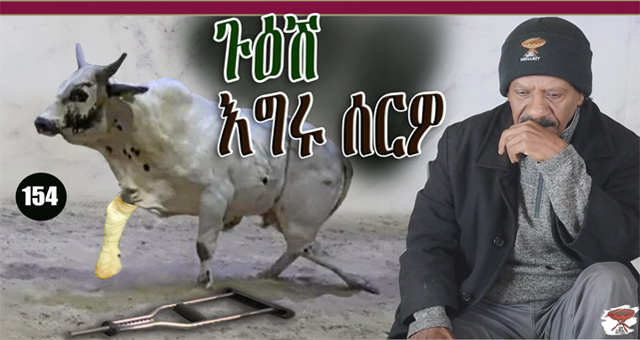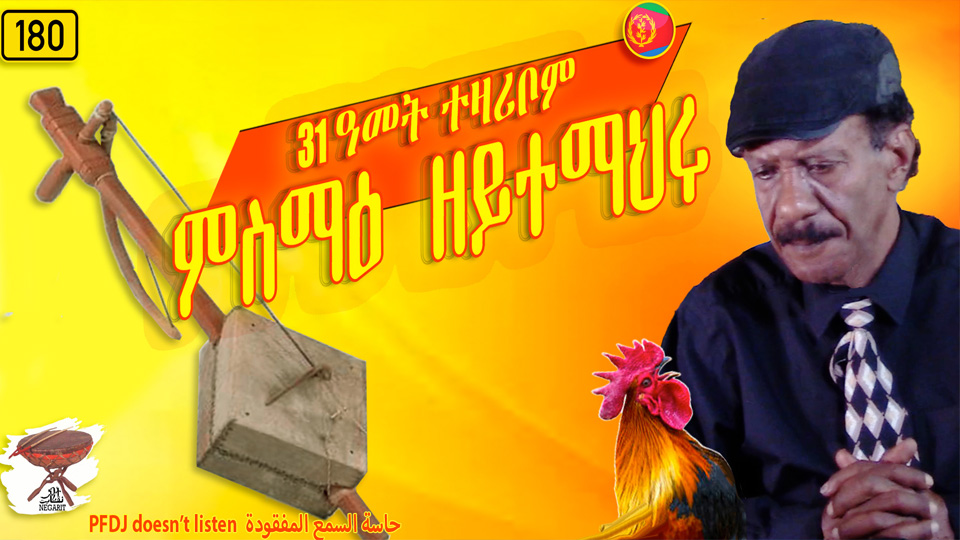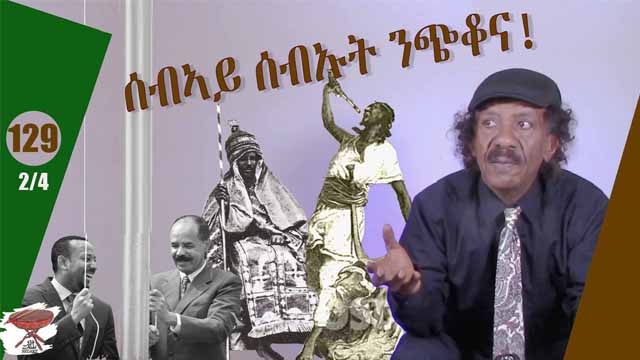“Goush the Shepherd Did It”
In a village council, when it was on a consultation break, a restless young man interrupted and said, “It’s Goush the shepherd who broke the bull’s leg.”
A dumbfounded councilman asked him, “who is Goush, and what bull are you talking about?”
The Young man confidently answered, “aren’t you talking about Tesfai’s bull whose leg is broken?”
“What are you saying? Tesfai bull didn’t break its leg. We are talking about his bull that fell off a cliff and he slaughtered it because we couldn’t save it. When that happened, neither you nor Goush were born. Don’t engage in a discussion that you don’t know about? Go away, restless … get lost….”
They chased the restless young man away. The Amhara have a description for such a person, “Tllq Biyye”—someone who dives into the unknown like a fly that dives into a bucket of water.
Water Shortage
Once when I was growing up, the water taps in the neighborhood went dry. Soon they discovered that one house whose tap was running. Until them, the girls used to walk all the way to Shifshfi or Daari rivers to fetch water.
I am not sure if it so until now, but then fetching water was the job of girls, I never saw a man carrying a bucket. And I cannot help but imagine if it was men fetching water instead of women. Ten or so girls gathered by the cement water container (Basca) that the tap filled non-stop. They chatted, giggled, and peacefully went home carrying buckets of water. Would it have been that smooth if it was ten men meet in the place in such a time of water crisis? I think there would be quarrels, arguments and squabbles. I never saw men carrying water, except rarely in the lowland countryside. I also didn’t see anyone paying for the water—maybe the elders had a way of chipping in to cover the bill.
If more than five men gather in one place in a time of water crisis, there would defiantly be rude and quarrels.
Blue Plastic Barrels Introduce to Eritrea
The blue chemical jars have been a landmark in our region since they became so popular in the eighties. People living in the Gulf States would have several of them waiting to be filled with gifts of clothes and other wares to be send to their families. The blue jar became an important asset, more valuable than the gift goods it came loaded with, to the extent a funny friend said, “we must make the Blue Jar the national symbol of the Eritrean Diaspora.” But doing that would trigger another problem: The PFDJ has already created enough complications regarding the flags and symbols we have that it’s preoccupying the restless “Goush-broke-the-bull’s-leg” crowd. That is why they are busy hating on the Eritrean flag when they know so little about it…And the blue jar reminded me of the Blue Eritrean Flag.
The Blue Flag
I am not going to speak about the flag yet, that is scheduled for next week’s Negarit 155 in which I will talk about its history. I hope the restless, uninformed crowd will not confidently say, “The flag that was given to us by the UN!” Until then, don’t forget this name: Degiat Beyen Zahlay. He was not a UN envoy, but an Eritrean parliamentarian, a notable gentleman. Those who don’t know him, wait for an explanation in the next episode.
They chased the Tlq Biyye, the HnTuy qolaa, away.
Martin and Berhin
In the eighties I and my English coworker, Martin, were at Bab Mecca, Jeddah, to meet a customer. He was not back from his long lunch break, and we decided to wait for him. While strolling around to kill time, I suddenly I met Berhin whom I didn’t see since we left the Eritrean. We hugged and greeted each other–as usual, loud and with excitement. He was carrying a big red bag. I asked him, “Why don’t you pull it instead of breaking your shoulder carrying it?” He said he doesn’t want the rollers to be worn out before the bag reaches its destination.
Birhin insisted we join him for tea, and I introduced him to Martin who asked me for how long we haven’t met. Then he remarked, “so, he is like you who wanted to die for his country!”
Martin never understood the idea. I laughed, and translated to Brhin, a typical country boy, what Martin said. He started to lecture him about love of a country and patriotism. Then he asked Martin, “you mean you wouldn’t die for you country? Isn’t Irelandiii fighting against your country?” Martin had an instant reply: “bloody no… I will not die for my country; we have soldiers who do that.”
You can imagine how tiring and hilarious the discussion was. Martin’s logic is weird, “Probably more British drivers die in road accidents than soldiers in war. They all do it for money.”
Why would one argue with someone with a different mindset and a different cultural outlook on emotional and abstract convictions? The British had been crazy nationalists, and they ruled half the world; now they found an easier and smarter way to control the world and serve their country through economic and political might.
But Brhin was irritated once more when Peter asked if he was traveling and Brhin explained the bag is full of gifts for his family and relatives back home. Martin frowned; Brhin asked me, “listen SaliH, doesn’t he have family and children to send gifts to?” Martin couldn’t understand the logic, “I’m lucky I don’t have a bloody child and my wife buys whatever she needs from England.
Now Brhin’t face displayed disgust, “Okay, tell him, may St. Mary give him a child.” he said. I translated; Martin mocked, “Is she distributing babies?” Brhin couldn’t stand that, “what an apostate! I never met anyone like him….” The grimace stayed on his face as he stood up and walked away after promising to meet me in a certain teashop. We never met again.
Martin, though he was born from a middle-class family, on the wrong side, the poor side of the railway, as he explained, he acted like an aristocrat. One day going to work, he opened the trunk of his car to put his bag in, but immediately closed it when he saw an “animal!” He drove to the work, about 40 mints away, in panic and parked in the middle of the yard. He jumped out and called for help pointing to the trunk, “there is an animal inside the trunk” he cried. He couldn’t describe the animal.
Martin inserted the key on the lock and stepped back to a safe distance. A Somali salesman carefully opened the trunk and looked inside; he couldn’t see anything there. He picked every useless thing and threw them out, including a cockroach that he picked it and threw it out. He was going to continue searching for the alleged animal if Martin didn’t scream, “that is it. That is it,” pointing towards the cockroach that was crawling out of the scene. The salesman reached at it and squashed it with his shoes while laughing hysterically. Martin was shaken but relieved.
I still don’t believe Martin, who grew up on the wrong side of the railway, never saw a cockroach in his life—I always teased him about that incident but we lost contact for a while now.
I haven’t forgotten I was talking about Patriotism…
The Falkland War
At that time the British-Argentina war over the Falkland Islands (Argentines called it Malvinas), was raging. The 600 or so Island archipelago is found some 300 miles east of Argentina’s southern tip with a population of about 4000 people. The British ruled the Islands since 1830 but in 1982, the Argentinian forces invaded the islands and claimed it. The enraged Margaret Thatcher responded by sending submarines and the British Air-force and drove the Argentinian forces away. By October 2020, they cleared all the landmines in the Argentinians planted in Falklands which is a British territory.
At that time, we had a warehouse manager with a fancy title, a typical British old-timer named Jeff, a racist to boot, and a nationalist. He had cleared his wall of the distribution truck route maps and their place he plastered a large map of Argentina and the Falklands. Holding colored markers, he was glued to the radio and updated the map by drawing arrows for invasion directions, starbursts for battle locations, and notes all over the map.
When I remember the actions of the Eritrean diaspora twenty-years ago, during the Baddme war, and the current Ethiopian civil war where Eritrea is involved, I can’t help but remember Jeff. The only difference is, we have produced thousands of Jeffs, who have the illusion they are war-room generals who are commanding imaginary troops and leading the wars.
Now, do you see the difference between Martin and Jeff? And what’s the moral of the story?
The morale of the story…
Values change and every human race or individual have some disgusting, irritating and abhorrent traits when seen from a different cultural or value lens, from a different perspective. The wisdom is in recognizing the diversity of thoughts and stop insisting that everybody must think alike as if they were pre-programmed robots.
People need to be open minded, be receptive to unfamiliar ideas, not to adopt them uncritically, but just to acknowledge that others have the right to think freely, and should not be expected to accept the views of other simply because one wishes to indoctrinate them. That, I see is one of the most important advancements that Eritreans need. If enough people are convinced of that, Eritreans will be fine because they are determined to be fine. However, chaff is delaying Eritreans and hindering them from becoming what they wish to become as a nation of freedom and justice. True patriots must not give up at all.




Awate Forum